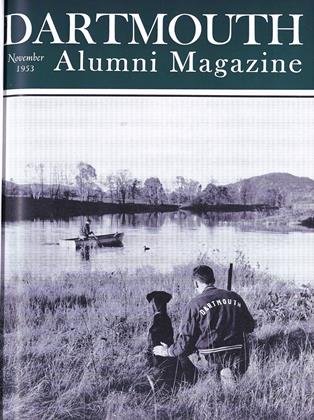By Robert Hayden Alcorn'31. New York: G. P. Putnam's Sons, 1953.254 pp. #5-00.
The author of Riding High, Robert Hayden Alcorn, first of all, in childhood, "was a horse." Many of us can look back to such play days when the imagination easily transformed us into prancing, high-spirited steeds. For some the dream was followed by reality, a pony, a horse of one's own to ride, but Robert Alcorn's progression from dream to reality, from stubborn mule to perfect hunter, though real indeed, seems more like a fairy tale, galloping on, in spite of the depression '30's, to a hunt meet in the shadow of Old World castles.
Riding High is an autobiographical tale of the author's life with his horses. With a craftsmanship that vies with his horsemanship, Mr. Alcorn brings the past into the present. Episodes, conversations, minute details recreate the child's thrills, the boy's enthusiasms, the man's experiences with his horses and with the people within this orbit.
With encouragement from the voluble Ernie, the local hoss trader, "Ten years old by Jiminy and no hoss it ain't right I tell ya it ain't right...." Bobby persuaded his father to buy the pinto, Cody, who had "a quick, alert walk which tossed little puffs of dirt from under his feet." By such remembered impressions, horses, people, places have life and color for the reader.
Four years later came Raleigh, the fivegaited horse. "It was a tremendous sensation, the effortless feeling of being swept over the ground at a speed which made the wind whip your face " To Ernie it was the "sharpest doggone hoss deal I ever see." Next came Pocketpiece, the perfect hackney pony.
With three horses in the stable it was fortunate that Benny came home. He had worked on the place years before when grandfather had horses. Benny loved his horses, cleaned them until "If'n a fly light on 'im now he gonna slip an' break his leg." With Benny came an interest in horse shows in spite of Ernie's tirades against the show game.
When Ned Morgan came to town to manage a stable of hunters, college vacations were filled with lessons in jumping. With three horses in the stable there now had to be a fourth, a big Irish hunter named Hi-Boy. After Dartmouth came two years at Cambridge University where there was plenty of hunting, reaching its climax in Ireland; for, as Ned said, "You've never hunted until you've hunted with the Meath." With a light yet firm touch, as expert as his hands upon the reins, the author gives a picture of this day that makes the pulse beat faster as Hi-Boy overcomes the seemingly impossible obstacles..
The excitement of organizing a hunt in the countryside at home in Connecticut is abruptly halted in 1941, but at this point one may turn back to the Prelude and read with a deepened understanding of the author's return to his beloved stable in 1945.
 View Full Issue
View Full Issue
More From This Issue
-
 Article
ArticleMore Scholarships
November 1953 By ROBERT L. ALLEN '45 -
 Article
ArticleThe Measure of Maturity
November 1953 -
 Class Notes
Class Notes1918
November 1953 By ERNEST H. FARLEY, W. CURTIS GLOVER, RICHARD P. WHITE -
 Article
ArticleThe Faculty
November 1953 By HAROLD L. BOND '42 -
 Class Notes
Class Notes1926
November 1953 By HERBERT H. HARWOOD, H. DONALD NORSTRAND, CARLETON BLUNT -
 Class Notes
Class Notes1916
November 1953 By F. STIRLING WILSON, C. CARLTON COFFIN, H. CLIFFORD BEAN








